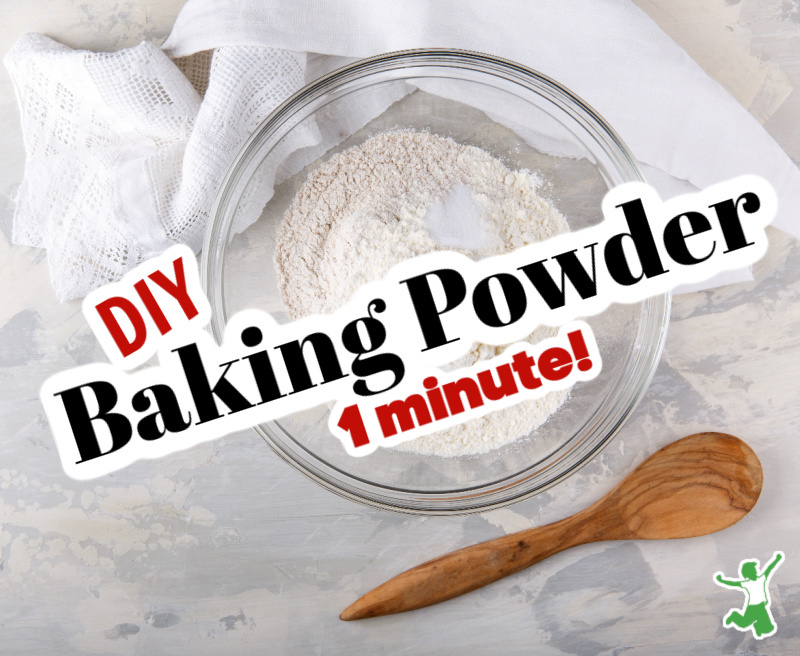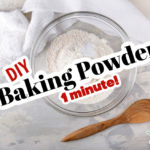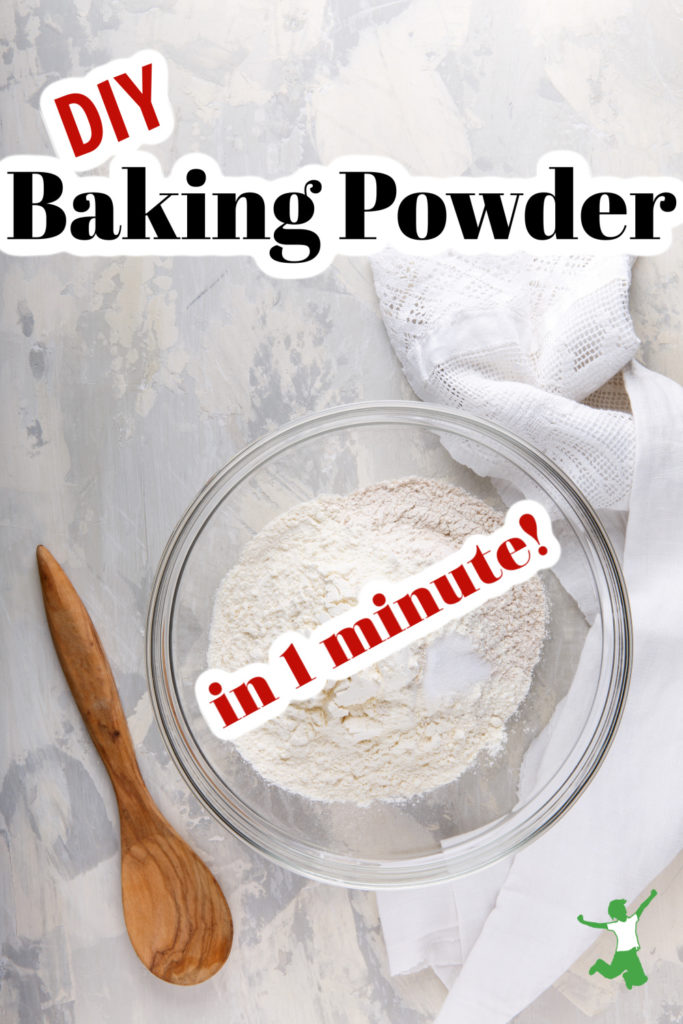Tips for finding the healthiest baking powder at the store with optional recipe for quickly mixing it up in one minute yourself for pennies per serving.

Healthy baking powder is a must in the kitchen of a savvy cook. Used as a leavening agent, baking powder lightens the texture and increases the volume of baked goods such as muffins, cakes, pancakes, and cookies.
It works by releasing carbon dioxide bubbles into the wet batter in a chemical reaction. This process expands and helps to add optimal texture to the mixture.
Fast-Acting vs Slow-Acting
Baking powder can be fast-acting, slow-acting, or both.
Slow-acting baking powders work with the heat of the oven to provide a late rise to the dough.
Fast-acting baking powders work at room temperature and become effective immediately upon addition to the wet batter on the countertop.
Double-Acting
Most commercial baking powders are double-acting.
This means that they work both on the counter and in the oven providing an extra measure of reliability and consistency to the final product.
Baking Powder Contaminants
Many people do not realize that baking powder can contain undesirable ingredients and even toxins.
Aluminum
The problem with the double-acting baking powders is that they usually contain aluminum in the form of sodium aluminum sulfate or sodium aluminum phosphate.
Slow-acting baking powders have the same problem unless the acid salt used is sodium acid pyrophosphate.
Fast-acting, low-temperature baking powders contain just monocalcium phosphate, cream of tartar, potassium bicarbonate or sodium bicarbonate (baking soda), and starch.
This is typically the choice of health-conscious cooks trying to avoid aluminum in all its forms.
Aluminum consumption has been linked with the development of Alzheimer’s Disease.
The use of aluminum-based acid salts to leaven the dough can also sometimes give a slightly metallic taste to the final product.
Choosing an “aluminum-free” baking powder does not eliminate all health risks as is commonly thought.
GMOs and Starch
Starch is typically added to these fast-acting, aluminum-free powders to keep the baking powder from clumping over time.
Corn starch is the starch of choice which unless organic, is most likely derived from genetically modified corn.
I did a survey of baking powders at my local health food stores recently and did not find one brand that used organic corn starch.
I did find one that used nonGMO potato starch. But, if one is on a low-carb diet, this baking powder is not a great choice either.
Good news! Rumford baking powder has a new formulation using GMO-free corn starch.
Many other brands are still using GMO ingredients, however, so read ingredients carefully!
It seems the best solution all around is to make your own! Baking powder takes seconds to mix and is fresh and potent each time you need it.
How to Test Commercial Baking Powder for Potency
This eliminates another problem with store-bought baking powders that lose strength over time.
To test effectiveness, stir a teaspoon into a small cup of hot (not boiling) water.
If it fizzes it is still usable. If it does not fizz, throw it away.
Make Your Own! (aluminum-free, starch-free, nonGMO)
Check out the recipe for making healthy baking powder below. It is so simple to make yourself and cheaper too!
You might be wondering why you haven’t been doing this all along!
One important tip for making DIY baking powder.
Do not make a large amount and store it in the pantry, as it will absorb moisture and get hard.
Make only as much as you need for each recipe.

Baking Powder Recipe
How to make baking powder in less than a minute.
Ingredients
- 1 tsp baking soda
- 2 tsp cream of tartar
- 2 tsp lemon juice optional. Use instead of the cream of tartar if you are on the GAPS or SCD diets.
Instructions
-
Mix the baking soda and cream of tartar in a small bowl.
-
Use immediately.
Recipe Notes
Note that if your recipe includes yogurt, kefir, buttermilk, lemon juice or vinegar, there is no need to mix up baking powder. Just use baking soda alone and the acidity already included in the recipe will activate it to provide the desired dough leavening effect with no cream of tartar.









Hello,
I red all comments and still did not understand is Monocalcium phosphate have health risk or not? I bake a lot, and found flower ( which give perfect result every time) but it is contain this ingredient. May somebody please explain to me if it is safe to use it?
Hi Sarah,
One error in the above article, you say that “low temperature baking powders contain just monocalcium phosphate (cream of tartar), potassium bicarbonate or sodium bicarbonate (baking soda) and starch”. You are right that they contain monocalcium phosphate but that’s not cream of tartar.
Actually cream of tartar is potassium bitartrate aka potassium hydrogen tartrate, it has no calcium and no phosphate. (see Traditional baking powder (which does contain monocalcium phosphate aka calcium acid phosphate), was developed by Rumford in the 1850s as a replacement for cream of tartar because cream of tartar could not be packaged with baking soda as the reaction would occur in the package. )
Another alternative is Bakewell Cream, which contains acid sodium pyrophosphate aka sodium acid pyrophosphate aka disodium pyrophosphate. Bakewell Cream normally contains cornstarch but can be obtained from the manufacturer (The New England Cupboard) as pure acid sodium pyrophosphate. Normally, it used in conjunction with baking soda but It is also sold with the baking soda already mixed in, as Bakewell Cream Baking Powder, either with or without the starch. Bakewell Cream and Bakewell Cream Baking Powder do not contain aluminum.
BTW, the addition of cornstarch is simply to make it more resistant to moisture and thus able to be packaged in cans. (acs.org/content/acs/en/education/whatischemistry/landmarks/bakingpowder.html#P32_4208). I’m guessing this is why Bakewell Cream packages their starch free variants in paper.
Bakewell Cream products can be found in most New England supermarkets or can be purchased online from the New England Cupboard ) or from King Arthur Flour. The traditional (since WWII, when cream of tartar was scarce) Maine recipe for biscuits is on the can. I am not affiliated with either company; I only just began researching this topic recently as my brother-in-law is allergic to cornstarch and my mother made biscuits with Bakewell Cream.
I wrote to the company that makes FeatherLight to get a confirmation about any corn content in their process of making it. Here is there vague reply:
(Thank you for taking the time to contact us regarding our Featherweight® Baking Powder.
If a corn ingredient is directly added to a product, it will be specified in the ingredient list. Corn is widely used as a carrier and processing aid in the manufacturing of foods and may be present in trace amounts in natural flavors, spices, or added vitamins. We encourage you to consult with your health care provider to determine if this product is appropriate for you.)
Now I ask you, how can a Doctor know anything about a product unless the company making that product if upfront with the information? I don’t trust this company and would not recommend anyone with a corn allergy dealing with them.
On the side of the Rumford baking powder it says that it uses non-GMO cornstarch.
It is my understanding that those on a yeast-free diet may use baking powders which contain monocalcium phosphate, but not those that contain cream of tartar because of the yeast content. I see above you have “monocalcium phosphate (cream of tartar). Are you defining them as the same thing? I’m trying to find some documentation that they are not the same thing in order to use baking soda in a one of my gluten free recipes safe for those with yeast allergies. Any help would be appreciated.
Hi , I’d like to thank you for the informations and I want to tell you that I have seen recently a baking powder made with organic rice starch, monocalcium phosphate, sodium bicarbonate. The name of the brand is “Bakers” made in Surrey, BC.Canada.
what brand of baking powder used org cornstarch?
RUMFORD brand by the CLABBER GIRL CORPORATION is Aluminum,gluten and GMO free.
I just got Rumford. It says Non GMO, no GMO corn on the can. I guess that’s better than making no claim, huh? What is monocalcium phosphate – is it bad? I ate a bunch of Jovial cookies – they’re supposed to be healththier – and then got a headache.
Hi Sarah,
I am a silent admirer of your blog. Your blog has enlightened me on so many critical and intangible evil things about food and health. Thank you.
Reg. baking powder, what do you think about ‘Frontier Naturals Organic Baking Powder’? It claims to be Aluminium-free and uses organic corn starch. Thanks again.